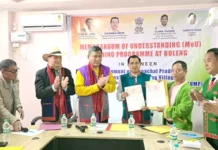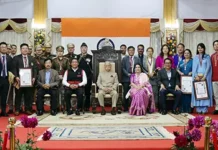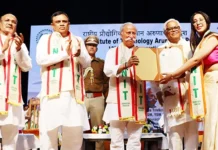Peace amidst chaos: Be like a lotus in the mud
[ Sri Sri Ravi Shankar ]
A bottle of water is worth more in a desert than when you are sitting by a spring. Being calm and peaceful when everything around you is peaceful has no meaning. But when everything around is falling apart, and yet you can retain your smile, that peace has value. When people blame you, when they don’t understand you, that’s when you need the inner strength to keep smiling. When you are surrounded by chaos and confusion, calmness is most needed then.
Bliss comes out of chaos, and the ability to enjoy chaos is enlightenment. When things don’t go your way, that’s when you need the endurance, strength, and courage to remain unperturbed.
Lord Krishna said in the Gita, “Samatvam yogauchate,”, which means equanimity is the test of your yoga. Mahatma Gandhi’s life companion, Kasturba Gandhi, was on her deathbed. Doctors had given up hope. They said, “Just a few hours or minutes – that’s it – for her to live.” In that moment, Gandhiji came out of his kutir and told Pandit Sudhakar Chaturvedi, “Read that verse from the Gita to me.” When he recited the Gita, Gandhiji said, “Today is my examination.”
Enlightenment is all about living from a depth of life. When your roots are deep, when you live from the depth of your being, then the world may shake, but you remain unshaken. You experience the storm, but the storm does not consume you.
Be like a lotus that grows in a muddy pond, and yet remains untouched by the mud. The lotus leaf is in the water, but if you put a drop of water on it, it sits like a gem, without sticking to the leaf. Similarly, be here in this world like a lotus without getting stuck to anything. When you just agree to be with the conflict and chaos, they disappear.
How can you remain centred? Shift your awareness from the experience to the one who is experiencing, the experiencer. All experiences are on the circumference; they keep on changing. The unchanging experiencer is at the centre. Again and again, come back to the experiencer.
If you are frustrated, instead of spending all your time on the experience of frustration, ask, “Who is frustrated?” If you are unhappy, ask, “Who is unhappy?” If you think you are ignorant, ask, “Who is ignorant?” If you think poor me, ask, “Who is ‘poor me’?” Shed all your faces and face the I.
Orderliness and chaos are two sides of the same coin. There are two ways to look at uncertainty – uncertainty can either heighten your enthusiasm and joy, or it can pull you into fear, anxiety, and depression. When you are waiting for a surprise, what are you really looking for? Something you are not expecting, right? Pleasant surprises bring a thrill to life, they uplift your spirit. When you watch a movie, if you already know what is going to happen in the next scene, it is not so interesting. But when you don’t know what will happen, there is a sense of joy and excitement.
When does uncertainty make you anxious? When you lack the confidence that you are being taken care of, that there is a power in the creation which loves you dearly and is taking care of your needs. Uncertainty can cause fear. But uncertainty can also be seen as a field of all possibilities.
Life is a journey from an ugly “I don’t know” to a beautiful “I don’t know.” Ugly “I don’t know” is when you are frustrated: “I don’t know, don’t ask me!” But the beautiful “I don’t know” is wonderment. Turn your question into wonder! Buddha said, “Unuttaro Bhava” – become answerless. He never said, become question-less! When you are in wonder, then real devotion springs.
Finding harmony in chaos, bliss in suffering, wisdom in foolishness, light in darkness, immortality in a place of death is Bhagavad Gita.
Turbulence is a part of this world, whereas making peace is the nature of our spirit. If with a strong resolve and skill, we are able to remain centred in peace, it does not remain limited to just us, it begins to calm down the turbulence around us as well.



